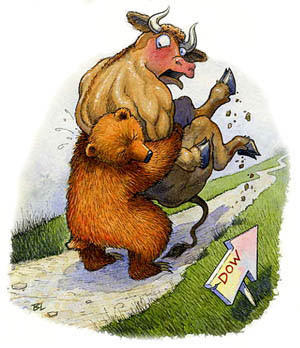“The Committee is prepared to provide additional monetary accommodation through unconventional measures if it proves necessary, especially if the outlook were to deteriorate significantly,” the Fed chairman said today in opening remarks to central bankers from around the world at the Kansas City Fed’s annual monetary symposium held in Jackson Hole, Wyoming.
The Fed chairman gave a detailed analysis of the economy and said growth during the past year has been “too slow” and unemployment too high. Still, he said a hand off from fiscal stimulus and inventory re-stocking to consumer spending and business investment “appears to be under way.” He also said that the “preconditions” for a pickup in growth in 2011 “appear to remain in place.”
Bernanke said the risk of an “undesirable rise in inflation or of significant further disinflation seems low.” He said the Fed has several tools if prices decelerate, or job growth stagnates, including shifting the composition of its bond reinvestment strategy.
Stocks advanced and Treasuries declined after Bernanke’s comments. The Standard & Poor’s 500 Index rose 1.2 percent to 1,059.35 at 11:33 a.m. in New York. The yield on the 10-year Treasury note climbed to 2.61 percent from 2.48 percent late yesterday.
‘Ready to Take Action’
“The Fed is ready to take action if needed,” said John Silvia, chief economist at Wells Fargo Securities LLC in Charlotte, North Carolina. “They are aware the economy is not doing as well as expected.”
Federal Reserve officials put their exit strategy on hold this month and decided to purchase Treasury securities to keep their portfolio from shrinking as their mortgage bonds mature. Economists at Goldman Sachs Group Inc. and JPMorgan Chase & Co. say the Fed could boost monetary stimulus if the economy continues to deteriorate.
“The FOMC’s recent decision to stabilize the Federal Reserve’s securities holdings should promote financial conditions supportive of recovery,” Bernanke said. “Additional purchases of longer-term securities, should the FOMC choose to undertake them, would be effective in further easing financial conditions.”
Fed Symposium
The Kansas City Fed is hosting central bankers from more than 40 countries including Brazil, Malawi and New Zealand this year as well as economists from firms such as Bank of America Corp., Morgan Stanley and International Strategy & Investment Group Inc. U.S. central bankers next meet Sept. 21 for a one-day meeting.
Bernanke offered more detail on how securities purchases provide monetary stimulus.
“Specifically, the Fed’s strategy relies on the presumption that different financial assets are not perfect substitutes in investors’ portfolios,” he said. Fed purchases of Treasuries should push investors into other types of bonds with similar types of risks, lowering their yields as well, he said.
Risks of the strategy include a lack of “very precise knowledge” of the effects of the purchases and the chance that expanding the Fed’s balance sheet further “could reduce public confidence in the Fed’s ability to execute a smooth exit from its accommodative policies at the appropriate time.”
Communications Strategy
A second option, Bernanke said, would be to communicate that the Fed will keep its benchmark rate low for a “longer period than is currently priced in markets.” While the Bank of Canada’s 2009 adoption of the strategy “seemed to work well” there, a risk is that investors “may not fully appreciate that any such commitment must ultimately be conditional on how the economy evolves,” Bernanke said.
Lowering the interest rate on banks’ deposits at the Fed to 0.10 percentage point or zero from 0.25 percentage point is a third choice, Bernanke said. The effect of such a move on financial conditions “in isolation would likely be relatively small,” and it risks making the market for overnight loans, or federal funds, “much less liquid,” he said.
“In normal times the Fed relies heavily on a well- functioning federal funds market to implement monetary policy, so we would want to be careful not to do permanent damage to that market,” Bernanke said.
Proposal Dismissed
Bernanke dismissed a proposal by some economists to increase the Fed’s inflation goals “above levels consistent with price stability.”
“I see no support for this option on the FOMC,” he said. “Inflation would be higher and probably more volatile under such a policy, undermining confidence and the ability of firms and households to make longer-term plans, while squandering the Fed’s hard-won inflation credibility,” he said.
Bernanke spoke after the Commerce Department today cut its estimate for U.S. economic growth in the second quarter to an annual pace of 1.6 percent from an initially reported 2.4 percent pace. Reports on employment, manufacturing and housing in the past month have indicated the recovery is faltering.
“Incoming data suggest that the recovery of output and employment in the United States has slowed in recent months, to a pace somewhat lower than most FOMC participants projected earlier this year,” Bernanke said. “Consumer spending may continue to grow relatively slowly in the near term.”
Capital Spending
The economy is expanding at about a 1.7 percent annual rate in the current quarter, according to estimates by Macroeconomic Advisers in St. Louis. Capital spending declined in July, and sales of existing homes fell a record 27 percent. Manufacturing in the Philadelphia region weakened in August, according to an index compiled by the Philadelphia Fed.
Intel Corp., the world’s biggest chipmaker, today cut its forecasts for third-quarter revenue and gross profit margin, citing weaker demand for personal computers in mature markets.
“Investment in equipment and software will almost certainly increase more slowly over the remainder of this year, though it should continue to advance at a solid pace,” Bernanke said.
Back-to-back quarters of growth below 2 percent are likely to push unemployment higher and put more downward pressure on inflation, which is already lower than the Fed’s longer-term desired range, economists say.
‘Big Split’
“There’s a big split” on the Federal Open Market Committee “between people concerned about inflation rising in the future and those concerned about deflation,” said Dean Croushore, a former Philadelphia Fed economist who is now chair of the economics department at the University of Richmond in Virginia. “The Fed is unlikely to make any major changes soon.”
Economists estimate that the unemployment rate will rise to 9.6 percent in August from 9.5 percent in June and July, according to the median forecast in a Bloomberg News survey. The Fed’s preferred inflation indicator, the personal consumption expenditures price index, minus food and energy, rose at a 1.1 percent annual rate in the second quarter.
Fed officials said in June their longer-run preference range for inflation is 1.7 percent to 2 percent.
‘Sharp Downturn’
Consumer confidence has been sapped by this year’s 5.7 percent decline in stocks, with the S&P 500 Index falling 5 percent this year. Confidence rose less than forecast in August from an eight-month low, a Thomson Reuters/University of Michigan index of showed today.
Central bankers this month decided to reinvest about $18 billion a month of maturing agency and mortgage-backed securities back into U.S. Treasuries. They also adopted a $2.05 trillion floor for their securities portfolio.
Bernanke said that lower long-term interest rates increased mortgage refinancing, causing a more rapid prepayment of the Fed’s $1.1 trillion in mortgage-backed securities holdings. Further weakening of the economy, and even lower long-term rates could create “a bad dynamic” in the Fed’s portfolio, he said.
“Any further weakening of the economy that resulted in lower longer-term interest rates and a still-faster pace of mortgage refinancing would likely lead in turn to an even more- rapid runoff of MBS from the Fed’s balance sheet,” Bernanke said. “Thus, a weakening of the economy might act indirectly to increase the pace of passive policy tightening -- a perverse outcome.”
Mortgage Repayments
The Fed has already experienced about $140 billion of repayment of mortgage and agency debt, he said.
“Although mortgage prepayment rates are difficult to predict, under the assumption that mortgage rates remain near current levels, we estimated that an additional $400 billion or so of MBS and agency debt currently in the Fed’s portfolio could be repaid by the end of 2011,” the Fed chairman said.
Policy makers in August decided that allowing the Fed’s balance sheet to shrink when the economic outlook “had weakened somewhat was inconsistent with the Committee’s intention to provide the monetary accommodation necessary to support the recovery.”


















